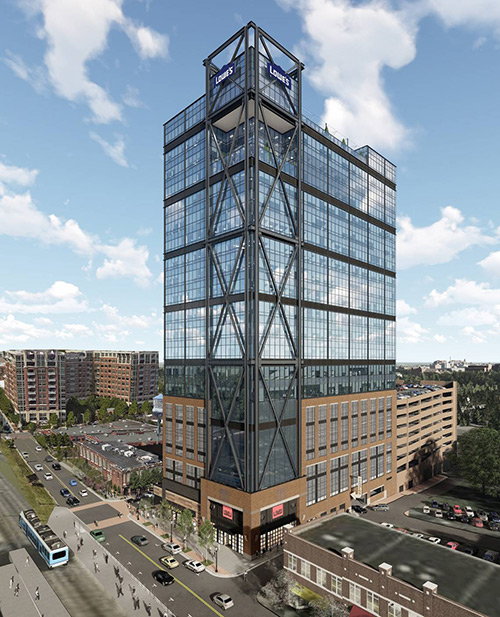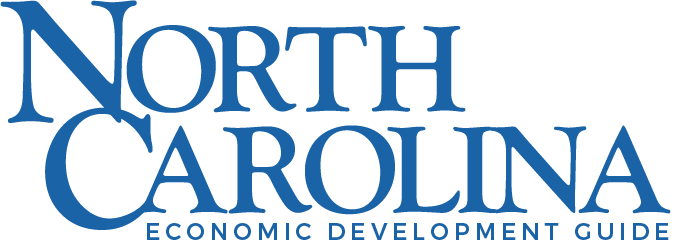Ahead of the game
Mecklenburg County is the site of 425 corporate headquarters while Charlotte, right, is home to six companies on the Fortune 500 list, including Bank of America Corp., Brighthouse Financial Inc. and Duke Energy Corp.
More major corporate boards are picking Charlotte as their main base as the city’s reputation as a business powerhouse accelerates.
Quick look: The Charlotte region shines as home to 425 corporate headquarters, including 17 listed in the Fortune 1000.
By Harrison Miller
In downtown Charlotte, between St. Peter Catholic Church and the Bechtler Museum of Modern Art, a sign posted on a 1.5-acre pocket park reads “Charlotte — The Center of the Known World.” Created by artist Gary Sweeney in 2002, the signpost marks the mileage and direction to other cities named “Charlotte” in Vermont, Texas, Australia and other locations across the world. As the second-largest financial hub in the nation, home to more than a dozen Fortune 1000 companies, and one of America’s fastest-growing tech markets, the Charlotte region has made a name for itself as a bustling business hub.
Mecklenburg County alone is home to 425 corporate headquarters. Pending some final relocations, the area will become home to 17 of the nation’s 1,000 largest publicly traded companies ranked by Fortune magazine. According to the Charlotte Regional Business Alliance, more than half of the companies on the Fortune 500 have one or more facilities in the region’s area. Meanwhile, about 1,040 foreign firms are represented in the Charlotte-Mecklenburg metro area. The multitude of businesses and a solid economy contributed to Charlotte’s $174 billion gross domestic product in 2017, which accounted for almost 1% of America’s total GDP.
Charlotte’s skilled labor force, cost of living at 3.8% below the national average, business-friendly environment and access to major transportation networks are a few of the key factors for recruiting and retaining its big corporate players, according to the business alliance.

Electronics manufacturer and technology giant Honeywell is relocating its global headquarters to a 23-story office building under construction in downtown Charlotte.
The Queen City is home to six companies on the Fortune 500 list, including Bank of America Corp., Brighthouse Financial Inc., Duke Energy Corp., Honeywell International Inc., Nucor Corp. and Sonic Automotive. Retail giant Lowe’s Cos. Inc. is stationed 30 minutes north in Mooresville. In 2018, the seven companies generated more than $300 billion in revenue; if the companies were their own country, they would rank among the top 45 in the world in terms of gross domestic product, according to international financial institution World Bank.
Electronics manufacturer and technology giant Honeywell, which ranks No. 77 on the Fortune 500 list, has relocated its global headquarters from Morris Plains, N.J., to Charlotte. About 250 senior-management jobs transferred from the Garden State to the Queen City last fall, and the company plans to add 500 more positions over the next five years.
“Charlotte is a top-10 destination city in the U.S. that will readily enable us to recruit and retain the world-class talent we will need over the long term to support Honeywell’s strategic focus on leading technology and software solutions within our end markets,” CEO Darius Adamczyk said in a press release.
Honeywell is leasing space at a 23-story office building under construction at the Legacy Union development in downtown Charlotte. It plans to occupy 280,000 square feet across nine floors of the building near Bank of America Stadium, which hosts the Carolina Panthers football team. Construction is set to be completed in 2021.
“We selected Charlotte because it offers a great business environment along with access to a workforce that has the skill set Honeywell will need to be competitive over the coming decades,” Adamczyk noted. Other cities considered included Atlanta; Houston; Orlando, Fla.; and Tampa, Fla.
The November 2018 announcement came a day after N.C. lawmakers approved doubling the state’s job-development tax breaks to $16,000 per job — about $12 million total for Honeywell. The maker of smart, automated consumer and commercial appliances will also receive as much as $88 million in combined state and local incentives based on job and investment targets. The county expects to generate $51 million in net revenue over the 15-year grant.
Another powerhouse is on its way with soon-to-be-merged BB&T Corp. and SunTrust Banks Inc. moving from existing headquarters in Winston-Salem and Atlanta, respectively. Pending regulatory approval, the result will be Truist Financial, the sixth-largest U.S. bank with more than $440 billion in assets.
The combined institution will take up more than half of the 46-story Hearst Tower in downtown Charlotte. Truist expects to eventually employ 2,000 people, including corporate communications, finance, human resources, insurance, legal, technology and risk-management teams. The location puts the bank in the heart of a vibrant financial district that will help create a transformational financial institution, Kelly King, BB&T chairman and CEO, said in a press release. State and local governments didn’t provide incentives for the combination. Instead, the companies targeted Charlotte because of its affordability and attractive labor market, Mayor Vi Lyles says.
Cutting costs and additional spending for innovation and technology are key forces in the BB&T-SunTrust deal. The combination is expected to result in $1.6 billion in savings by cutting redundant operations and overlapping branch locations. “One of the most powerful benefits of this merger is that we are able to take significant costs out from redundant areas and reinvest it into innovation, technology and our talent,” BB&T Chief Financial Officer Daryl Bible said in a release.
At its new Charlotte office, Truist plans an Innovation and Technology Center, where workers will focus on automation, developing and improving digital services, and enhancing cybersecurity. “[It will] be the hub of our efforts to drive digital transformation through innovation,” says William Rogers, SunTrust chairman and CEO. He is slated to succeed King as the combined company’s CEO in September 2021.

Home-improvement retailer Lowe’s Cos. plans to open global technology headquarters in Charlotte’s South End neighborhood. It will add more than 1,600 high-paying tech jobs to the area over the next several years.
Other big Fortune 500 firms are investing heavily in tech in Charlotte. In June, Lowe’s said it plans to open a global technology headquarters in the South End neighborhood just south of downtown. The announcement is part of Lowe’s initiative to improve its technology to propel growth.
The home-improvement chain plans to bring more than 1,600 high-paying tech jobs to the area over the next several years, seeking software and infrastructure engineers, data scientists and analysts, architects, and technologists with artificial intelligence and machine learning experience. The goal will be to improve customer service and offer new capabilities, both online and through an app, Seemantini Godbole, Lowe’s chief information officer, said at the June announcement.
As part of the $153 million investment, Lowe’s will occupy 15 floors of a 23-story office building expected to be completed in 2021. The state is providing $54 million in incentives paid over the 12-year project duration, based on meeting job and investment targets.
As the headquarters of Bank of America Corp. and as the largest employment center for Wells Fargo & Co., the Queen City has been an established financial powerhouse for decades. Charlotte banks had $2.3 trillion in assets as of 2018, according to the business alliance, making it the second-largest financial center in the nation behind New York.
It’s also one of the nation’s largest-growing tech hubs. The city’s tech talent pool increased 48% between 2013 and 2018. Tech workers now comprise 4.6% of the total labor force, compared with the national average of 3.5% for metro areas, according to CBRE Group Inc., a real estate investment-services company.
The Queen City is receiving a lot of recognition for its tech talent. Charlotte was rated the best place to work in tech for 2019 by the Computing Technology Industry Association and the least-expensive place to base your tech startup by Bloomberg Technology. It also had the nation’s fastest-growing tech talent pool in the country for the second consecutive year, according to CBRE. Only Toronto grew faster in North America.
While the Raleigh-Durham area has for decades received more acclaim for its status as a major tech center, Charlotte is catching up. Raleigh’s 61,040 tech workers still exceed Charlotte’s workforce of 55,430. But Charlotte’s average tech salary has grown 9.2% over the last five years to $95,952, surpassing the Triangle average of $95,707, which increased 8.9% during the same period, according to CBRE.
The Computing Technology association projects Charlotte and Raleigh’s tech-sector jobs to grow by 11% over the next five years.
In addition to Charlotte’s lower-than-average cost of living, a number of factors have lured people and businesses to the area to drive growth, including its large skilled workforce and business-friendly environment.
The Charlotte metropolitan area has a population of 2.5 million, and 45% of Mecklenburg County adults hold bachelor’s degrees or higher. Charlotte alone added 13,515 residents over the last year, bringing the total population to 872,498 and making it the 16th-largest city in the nation.
The Queen City has been a major driver of Mecklenburg County’s 16.6% population increase in the last decade, providing companies with plenty of potential talent. Over the last year, the Charlotte-Mecklenburg area added nearly 12,000 jobs, and companies invested $1.03 billion in the region, contributing to the county’s 5.6% GDP growth over the year.
Economic developers also praise North Carolina’s pro-business policies and regulations. The state’s 2.5% corporate tax rate is among the lowest in the nation, according to the business alliance. The cost of doing business in the Tar Heel State is 10% lower than in the rest of the country, according to FiveThirtyEight, a New York-based research analytics firm. Last year, Forbes rated North Carolina as the best state for business, and the U.S. Bureau of Economic Analysis found it had the fastest-growing large economy in the nation. In addition to the state perks, Charlotte is home to the seventh-busiest airport in the world because of a big American Airlines hub.
Charlotte is also experiencing record-low unemployment. The city’s jobless rate was 3.7% in August after bottoming at 3.2% in September last year. That compares with a state average of 4.2% and a national average of 3.7%. Meanwhile, average wages in Mecklenburg County grew 5.7% to $66,225 between 2017 and 2018, outpacing an average 4.3% national increase.
Even in the wake of major investments over the last year, the Queen City is already preparing for its next phase of growth. Charlotte Center City Partners, a nonprofit that promotes development in downtown and South End, says the area has 5.1 million square feet of office space, 840,000 square feet of retail space, 2,276 hotel rooms and 8,363 residential units planned or under construction.
Trade battles and declining business confidence are raising concerns that economic development may slow in the next few years. About 74% of business economists expect a recession by the end of 2021, according to a July study by the National Association for Business Economists.
UNC Charlotte economist John Connaughton doesn’t share that pessimism. “With the national unemployment rate consistently below 4%, more job openings than job seekers, modest interest rates and continued consumer optimism, it will take a considerable negative event to slow the economy during 2019 or into 2020,” he said at an economic forecast event.
In any case, the city is quickly solidifying its place as the most important Charlotte in the world.
MORE INVESTORS IN THE QUEEN CITY

Janet LaBar, Charlotte Regional Business Alliance
Nearly 45,000 people are directly employed in headquarters offices in the Charlotte region, more than double the national average concentration of such talent, according to the Charlotte Regional Business Alliance.
“The Charlotte region offers access to national and international markets through the seventh-busiest airport in the world, a business-friendly climate with the lowest corporate tax rate in the country at 2.5%, and a professional service and headquarters talent pool twice the size of the national average,” says Janet LaBar, CEO and president of the business alliance. “Charlotte stands to benefit from increasing real estate prices and cost of living in more high-profile markets, particularly in the Northeast. Two of the three Fortune 1000 headquarters that have [been] announced in the last year alone have come from the Northeast.”
In addition to Charlotte’s strong Fortune 500 roster, the Queen City is now home to 17 Fortune 1000 headquarters. The biggest company that entered the market over the last year, behind Honeywell and the proposed BB&T and SunTrust merger, is Dentsply Sirona Inc., which announced it was relocating its headquarters from York, Pa., last May.
Dentsply Sirona, which ranks 628 on the 2019 Fortune 1000 list, makes equipment for dentists, orthodontists and oral surgeons. It was founded in 2016, when Dentsply acquired Sirona Dental Systems for $5.5 billion, creating a business with a combined market value of about $13 billion.
The company’s headquarters will be housed in Ballantyne Corporate Park, where it also trains dental professionals and provides demonstrations for its different product groups, which include a variety of instruments, imaging and hygiene systems, implant equipment and orthodontic tools. Last year, the company also announced it would invest $3.3 million to establish a commercial sales hub, which will create 320 jobs in Mecklenburg County over the next three years. The relocation and expansion was aided by about $4 million in state and local incentives and will build on Dentsply Sirona’s 145-employee local workforce at its current Charlotte site.
Other corporate expansions in the region included big national and international companies. Last February, accounting firm Ernst & Young LLP announced an $8.2 million investment to develop a new EY Wavespace Innovation Center in South End that will create 375 jobs over the next five years.
LendingTree LLC, which has called Charlotte home for more than 20 years, is planning to relocate from Ballantyne to South End. The company expects to invest $26 million to expand its headquarter operations, and will anchor 175,000 square feet of a new mixed-use development being constructed by The Spectrum Cos. and slated to open by January 2021. The expansion, which is being aided by about $10 million in state and local incentives, will bring 436 new jobs over the next five years. The company now has 488 workers in the area.
E-commerce giant Amazon opened a 1.1 million-square-foot fulfillment center in May, roughly the size of 28 football fields, in Kannapolis, about 30 miles northeast of Charlotte. The Amazon CLT3, which represents between a $50 million to $60 million investment for the company, now has 1,000 employees after initially projecting about 600 workers. Incentives included $624,700 from the city paid out over three years and $2.7 million of road improvements from the N.C. Department of Transportation.
Amazon also completed a 855,000-square-foot robotics distribution center next to the Charlotte Douglas International Airport, named Amazon CLT4, which opened in September. The company plans to hire 1,500 people at the $200 million center, adding to its current 3,500-employee workforce spread across warehouses in Kannapolis, Concord and Wilkinson Boulevard in Charlotte. The Charlotte City Council approved $13.4 million in road and infrastructure improvements for the airport-area facility last summer.
Mecklenburg County also got a boost from foreign firms last April. Tokyo-based Yokohama Tire Corp. constructed a $5.8 million research and development facility that will add 56 jobs, and Chinese forklift manufacturer Hangcha opened a U.S. headquarters in Charlotte.
The additions and expansions in the Queen City join the likes of Domtar Corp., Sealed Air Corp., Coca-Cola Bottling Co., Commscope Holding Co., JELD-WEN Holdings, Albemarle Corp., Curtiss-Wright Corp. and SPX Flow Inc. among the Charlotte region’s Fortune 1000 representatives.

